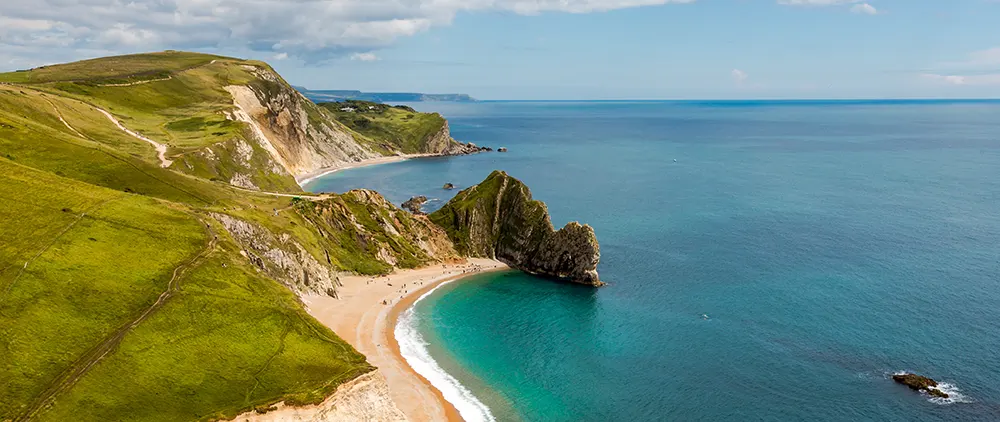
Lulworth Cove and Durdle Door in Local Attractions
Nestled along the Jurassic Coast of southern England, Lulworth Cove and Durdle Door are iconic examples of Mother Nature's artistic prowess. Located in the picturesque county of Dorset, these geological wonders have captivated visitors for centuries with their stunning beauty and rich geological history and accessible by the South West coast path.
Lulworth Cove: The Perfect C-shaped Bay
Lulworth Cove is a beautifully sheltered, horseshoe-shaped bay stretching along the coastline. It's a geological marvel, shaped over thousands of years by the relentless action of the sea on the soft rocks of the area. The bay's unique shape makes it an excellent destination for nature enthusiasts and beach lovers and is located on the south coast of the Lulworth estate.

The Formation of Lulworth Cove
The formation of Lulworth Cove can be traced back to the end of the last Ice Age, about 10,000 years ago. As the glaciers melted and the sea levels rose, the relentless power of the waves began to erode the soft clays and sands that formed the bay's cliffs. Over time, this erosion created the distinctive circular shape of Lulworth Cove. The clear waters and serene atmosphere make this place an excellent destination for swimming, kayaking, and snorkelling.
Visiting Durdle Door: Nature's Stone Arch

Just a short stroll to the west of Lulworth Cove, you'll find Durdle Door, a natural limestone arch that stretches dramatically out into the sea. It is one of the most famous landmarks along the Jurassic Coast and has captured the imaginations of countless photographers, filmmakers, and nature enthusiasts.
Durdle Door is a testament to the enduring power of erosion. The limestone that forms the arch is millions of years old and results from ancient sediment deposition and pressure. Over time, the sea gradually wore away the weaker rock layers, leaving behind the more resilient limestone arch with soft sand on Durdle Door beach. The name "Durdle" is thought to have been derived from the Old English word "thirl," which means to bore or pierce, a fitting description of how the sea has sculpted this natural wonder over time.
The views of the surrounding coastline from Durdle Door are breathtaking and provide ample opportunities for stunning photographs.
The Charm of the Jurassic Coast
Lulworth Cove and Durdle Door are part of the more extensive UNESCO World Heritage Site, the Jurassic Coast. This 95-mile stretch of coastline is a treasure trove of geological wonders, showcasing the Earth's history dating back over 185 million years. The dramatic cliffs and unique rock formations along this coast are an open book narrating our planet’s past story.
Visitors can explore the numerous walking paths and hiking trails along the cliffs, providing unrivalled panoramic coast views. Birdwatchers will also find a haven for birdwatching as the cliffs are home to various seabirds, including puffins.
Visitor Information and Conservation
Both Lulworth Cove and Durdle Door are located on privately owned land. To access these sites, parking fees go toward preserving and maintaining the area.
Visitors are encouraged to respect the environment and follow designated paths and rules to protect these natural wonders for future generations.
Additionally, the surrounding areas offer a variety of accommodations, including campsites, hotels, and vacation rentals, making it easy for visitors to experience the charm of this unique destination.
Location
Nearby...
Tyneham
Attraction -
3.65 miles away
Kimmeridge
Attraction -
5.79 miles away
Creech
Attraction -
6.86 miles away
Blue Pool
Attraction -
7.25 miles away
Church Knowle
Attraction -
7.35 miles away
Wareham
Attraction -
7.68 miles away
Kingston
Attraction -
8.30 miles away
Purbeck Mineral and Mining Museum
Attraction -
8.51 miles away
Corfe Castle
Attraction -
8.55 miles away
Dorset Adventure Park
Attraction -
8.82 miles away